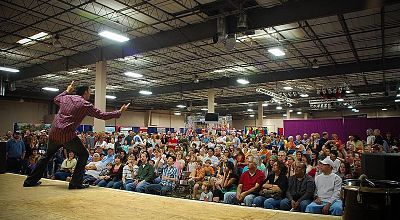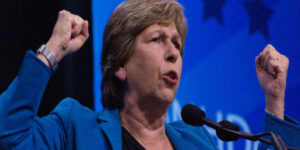Is the Church Neglecting Deaf Outreach?
There are few adults in the United States who don’t at least know of Jesus Christ. There are millions of churches, ministries, organizations teaching the truth across the nation.
So it follows that anyone who wants to hear the gospel has access to it, right? Not necessarily. The fifth-largest minority language in the United States is frequently passed over by churches: the deaf.
The Evangelical Free Church of America reports that, according to audiologist Dr. Marguerite Dartt, about 20 percent of Americans suffer some level of hearing loss. And yet, the language barrier between English speakers and those who communicate using American Sign Language is vast enough that the majority of America’s deaf are left outside the church.
The EFCA says the reasons for this discrepancy are twofold. For one thing, the deaf cannot assimilate by learning English as can native speakers of other languages. For another, failed ministries to the deaf have left parts of the ASL culture with a view of the church as unreliable and unloving.
Churches may never have intended to leave out this significant group of people, but whether from ignorance or carelessness, it has happened nevertheless. The EFCA is hoping to bridge this gap and help churches reach the deaf.
The EFCA has come up with three approaches for churches to use to help the deaf not only to grasp the concepts of the gospel message, but to feel a part of the body.
The first approach involves implementing technology such as FM pocket receivers, captions on a screen during sermons or telecoil loops in church auditoriums allowing people with hearing aids to pick up anything through the microphone.
The second approach is slightly more personal and involves training or hiring hearing signers who can interpret sermons, songs and classes for non-hearing individuals.
The third approach is the most involved. It recognizes that the deaf have their own culture and that translation alone is not enough to fully carry out a comprehensive ministry. This approach uses both hearing signers and deaf leaders to provide a church within a church.
This last approach has taken root at Hope Church in Springfield, Ill. A weekly ASL Bible study there began with two deaf people a year ago and has grown to 10 to 15. “I want more deaf people to know Him, so we have formed a deaf ministry team,” explains the group’s leader Leon Devriendt.
Any outreach to the deaf is rewarding, but it requires a great deal of commitment. “They are not a project,” notes one pastor. “They are people. It is important that whoever begins a deaf ministry plans to continue and make it quality. Get involved for the long haul.”




























































